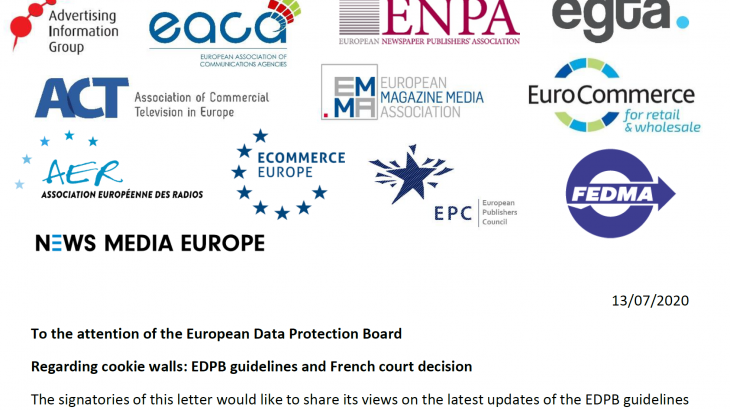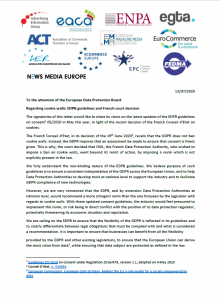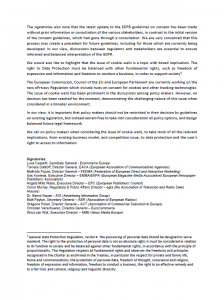AER, together with 11 trade associations, co-signs a joint letter calling the European Data Protection Board for GDPR flexibility for cookie walls.
The letter, drafted at the initiative of FEDMA – the Federation of European Direct and Interactive Marketing – follows up on the latest updates of the EDPB guidelines on consent 05/2020 in May this year, in light of the recent decision of the French Conseil d’Etat on cookies. The French Conseil d’Etat, in its decision of the 19th June 2020, recalls that the GDPR does not ban cookie walls.
The signatories call on the EDPB to ensure that the flexibility of the GDPR is reflected in its guidelines and to clearly differentiate between legal obligations that must be complied with and what is considered a recommendation. It is important to ensure that businesses can benefit from all the flexibility provided by the GDPR and other existing legislations, to ensure that the European Union can derive the most value from data, while ensuring that data subject are protected as defined in the law.
You can read the full joint letter here.
13/07/2020
To the attention of the European Data Protection Board
Regarding cookie walls: EDPB guidelines and French court decision
The signatories of this letter would like to share its views on the latest updates of the EDPB guidelines on consent 05/2020 in May this year, in light of the recent decision of the French Conseil d’Etat on cookies.
The French Conseil d’Etat, in its decision of the 19th June 2020, recalls that the GDPR does not ban cookie walls. Instead, the GDPR requires that an assessment be made to ensure that consent is freely given. This is why, the court decided that CNIL, the French Data Protection Authority, who wished to impose a ban on cookie walls, went beyond its remit of action, by imposing a norm which is not explicitly present in the law.
We fully understand the non-binding nature of the EDPB guidelines. We believe purpose of such guidelines is to ensure a consistent interpretation of the GDPR across the European Union, and to help Data Protection Authorities to develop tools at national level to support the industry and to facilitate GDPR compliance of new technologies.
However, we are very concerned that the EDPB, and by extension Data Protection Authorities at national level, would recommend a more stringent norm than the one foreseen by the legislator with regards to cookie walls. With these updated consent guidelines, the industry would feel pressured to implement this norm, or risk being in direct conflict with the position of its data protection regulator, potentially threatening its economic situation and reputation.
We are calling on the EDPB to ensure that the flexibility of the GDPR is reflected in its guidelines and to clearly differentiate between legal obligations that must be complied with and what is considered a recommendation. It is important to ensure that businesses can benefit from all the flexibility provided by the GDPR and other existing legislations, to ensure that the European Union can derive the most value from data, while ensuring that data subject are protected as defined in the law.
The signatories also note that the latest update to the EDPB guidelines on consent has been made without prior information or consultation of the various stakeholders, in contrast to the initial version of the consent guidelines, which had gone through a consultation. We are very concerned that this process may create a precedent for future guidelines, including for those which are currently being developed. In our view, discussions between regulators and stakeholders are essential to ensure informed and balanced interpretation of the GDPR.
We would also like to highlight that the issue of cookie walls is a topic with broad implication. The right to Data Protection must be balanced with other fundamental rights, such as freedom of expression and information and freedom to conduct a business, in order to support society.
The European Commission, Council of the EU and European Parliament are currently working on the new ePrivacy Regulation which include rules on consent for cookies and other tracking technologies. The issue of cookie walls has been prominent in the discussions among policy makers. However, no decision has been reached for the moment, demonstrating the challenging nature of this issue when considered in a broader environment.
In our view, it is important that policy makers should not be restricted in their decision by guidelines on existing legislation, but instead remain free to take into consideration all policy options, and design balanced future legal framework.
We call on policy makers when considering the issue of cookie walls, to take stock of all the relevant implications, from existing business model, and competition issue, to data protection and the user’s right to access to information.
Signatories:
Luca Cassetti, Secretary General – Ecommerce Europe
Tamara Daltroff, Director General, EACA (European Association of Communications Agencies)
Mathilde Fiquet, Director General – FEDMA (Federation of European Direct and Interactive Marketing)
Ilias Konteas, Executive Director – EMMA/ENPA (European Magazine Media Association/ European Newspaper
Publishers’ Association)
Angela Mills Wade, Executive Director – EPC (European Publishers’ Council)
Conor Murray, Regulatory & Public Affairs Director – egta (the Association of Television and Radio Sales Houses)
Dr. Bernd Nauen – AIG (Advertising Information Group)
Matt Payton, Secretary General – AER (Association of European Radios)
Grégoire Polad, Director General – ACT (Association of Commercial Television in Europe)
Christian Verschueren, Director-General – EuroCommerce
Wout van Wijk, Executive Director – NME (News Media Europe)


